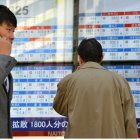Reciprocal tariffs cause Apple to lose more than $300 billion in market value in a single day
Approximately 90% of Apple's production occurs in China, which was hit with combined tariffs of at least 54% on its exports to the United States.

File image of an Apple store in 2021
Following President Donald Trump's announcement of reciprocal tariffs, Apple experienced an astronomical drop, losing more than $300 billion in market value in a single day and becoming one of the biggest victims of the trading day marked by the global tariff war.
The situation comes despite the great efforts of its CEO, Tim Cook, to approach the Trump administration with the aim of seeking a tariff exemption that, for now, did not arrive and puts Apple in a really compromising situation.
This situation occurs despite Apple's CEO, Tim Cook's great efforts to approach the Trump administration with the aim of seeking a tariff exemption. For now, this exemption has not arrived, putting Apple in a really compromising situation.
According to the Financial Times, Citi analysts highlight that 90% of Apple's production takes place in China, a strategic competitor of Washington that will face combined tariffs of at least 54% on its exports to the United States.

Politics
Trump predicts stock market boom after market plunge from reciprocal tariffs
Agustina Blanco
The company's impact is compounded by the imposition of strong tariffs of 46% and 26% on Vietnam and India, respectively, two countries where Apple, including iPhones, AirPods and Apple Watches, has been on the rise. This leaves the company facing a difficult dilemma: pass the costs on to the consumer through a price hike or absorb them, bluntly affecting its profitability.
As a result, Apple shares plunged more than 9% at the close of trading in New York, reducing its market capitalization from $3.36 billion to $3.05 billion, the biggest drop in its valuation in a single day.
According to analysts at TD Cowen, the situation becomes really complex for Apple, which has already experienced serious difficulties in its core business due to serious pressure from local phone makers in China.
According to TD Cowen, the company's U.S. sales account for nearly one-third of Apple's total revenue, most of it coming from hardware products, especially the iPhone, which accounts for nearly two-thirds of Apple's U.S. hardware revenue.
“Based on the range of hardware products that Apple sells . . . and the countries that manufacture them, we estimate that every 10 percent of tariffs would impact net income by 3.5-4 percent,” TD Cowen said in a note to clients.
Meanwhile, at Citi, they estimate that if Apple fails to avoid the tariffs on China as presented yesterday by the Trump administration, its total gross margin could be reduced by 9%.


























